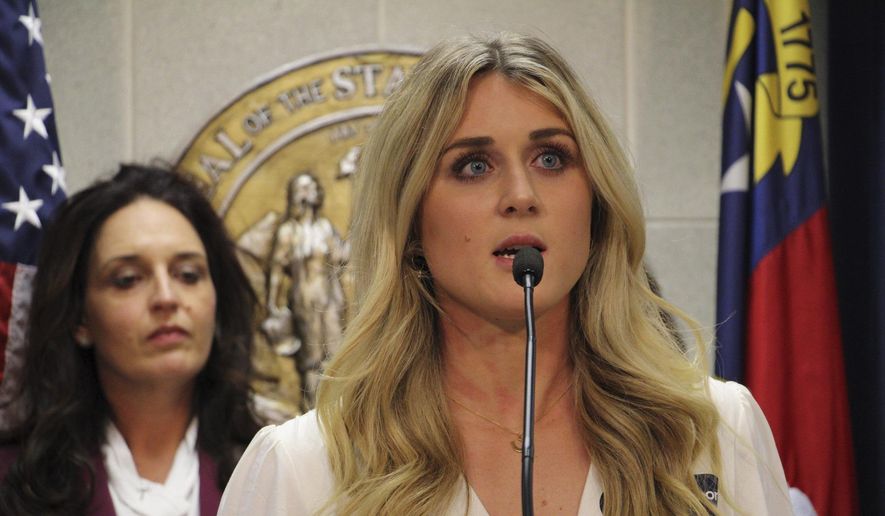The Kansas Legislature overrode Gov. Laura Kelly’s veto of a bill enacting a biological definition of the word “woman,” a measure that prevents courts and government officials from redefining the term to include biological men who identify as women.
The House on Thursday voted 84-40 and the Senate on Wednesday voted 28-12 to override the Democratic governor’s April 20 veto of Senate Bill 180, known as the Women’s Bill of Rights.
The measure, which now becomes law, defines a person’s sex as their “biological sex, either male or female, at birth,” based on their reproductive systems. The bill also creates accommodations for those born with Disorders of Sexual Development.
“By overriding the governor’s veto of the Women’s Bill of Rights, House Republicans stand with women and girls in Kansas and their rights to privacy, safety and dignity in single-sex spaces,” said the Kansas House leadership in a Thursday statement. “Trading one group’s rights for another’s is never okay.”
Celebrating the bill’s passage was a coalition of right- and left-tilting women’s groups that unveiled last year model legislation for the Women’s Bill of Rights, which gives the Legislature authority to preserve single-sex spaces such as public restrooms, locker rooms, athletic teams, domestic violence shelters and dormitories.
“Today is a huge win for Kansas women!” said Riley Gaines, All-American swimmer and spokeswoman for the right-of-center Independent Women’s Forum.
SEE ALSO: Kansas enacts law saving babies born alive
Ms. Gaines competed at the 2022 NCAA women’s swimming championships against Lia Thomas, who became the first male-born athlete to win an NCAA Division 1 women’s sports title after swimming for three years on the University of Pennsylvania men’s team.
“As a woman and a female athlete, I can attest firsthand to the importance of women having private spaces when safety and fairness are at risk,” said Ms. Gaines. “Now that the Women’s Bill of Rights will be Kansas law, women have clarity that when they enter a space labeled for ’women,’ biological men will not be inside.”
The override was decried by gender-identity activists who accused the Legislature of seeking to “erase” transgender people.
“KS just passed SB 180, dubbed the ‘women’s bill of rights,’” tweeted Katie Baylie, legislative director for Planned Parenthood Great Plains Votes. “The kicker: It literally enumerates NO rights for women. Its purpose then? To exclude the trans community in the name of women. Absolutely disgusting.”
Democratic state Rep. John Alcala compared arguments for the bill to those defending racial segregation before the civil-rights era.
“It’s the same sayings,” said Mr. Alcala, as reported by the Kansas Reflector. “I don’t want you in my bathroom, I don’t want you drinking out of my water fountain.”
Today, the Kansas House proudly voted to override the veto of the Women’s Bill of Rights. #ksleg</ a>
— Chris Croft (@CroftForKansas) April 27, 2023
Read the full statement from House leadership here pic.twitter.com/ndmekpHuQO</ a>
The Legislature also overrode Ms. Kelly’s veto of a bill to separate inmates by sex in jails, but fell short on a vote to overcome a veto of legislation to create a civil cause of action against physicians who perform gender-transition surgeries on minors.
The bills were part of a cache of transgender-related bills targeted for overrides by the Legislature after being vetoed last week by Ms. Kelly.
In her veto message, Ms. Kelly said she was concerned the bills would make the state less attractive to businesses and vulnerable to “expensive and unnecessary lawsuits.”
Lauren Bone, policy adviser for the feminist Women’s Liberation Front, cheered Kansas for establishing that “laws protecting all women cannot be changed outside of the democratic process.”
“WoLF fights to protect and restore the rights of women, such as lesbian and bisexual women who are disproportionately represented where female-only housing is most critical, especially in shelters and prisons,” Ms. Bone said. “This historic bill is especially important for ensuring the safety and dignity of these marginalized populations.”
• Valerie Richardson can be reached at vrichardson@washingtontimes.com.




Please read our comment policy before commenting.